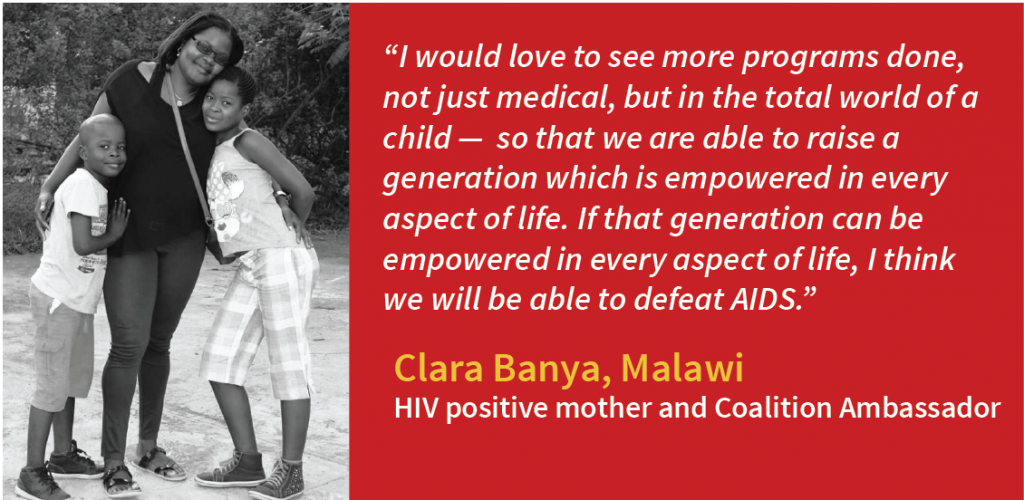Interview with Coalition Ambassador Clara Banya
Clara Banya, from Malawi, is a mother of two children. Her oldest child is HIV positive and her husband is also living with HIV. Clara is an outspoken advocate who often speaks about the problems and solutions to tackling stigma, improving access and adherence as well as how to support caregivers so that their children can survive and thrive with HIV. She is part of the Global Fund Advocates Network and National Coordinator for the International Community of Women Living with HIV (ICW Malawi Chapter).

My experience
As a mother and a caregiver of children living with HIV, we face a lot of challenges. Most of the children living with HIV come from very poor families. Half of the population of Malawi is illiterate; 75 percent of women are illiterate. HIV incidence among young girls is very high because they are not able to make informed decisions when it comes to sex. They can’t even negotiate for condom use. That can give you the picture of women living with HIV in my country.
I have two children. My firstborn is a girl who is 14 and HIV positive. I had her in 2003. At that time we did not have PMTCT (prevention of mother-to-child-transmission) in Malawi; it was just in a big referral hospitals where I could not access it.
In 2004, I noticed that I had developed a certain condition. I was working as a volunteer counselor at a district hospital and had seen a lot of patients coming out with the same condition who had been tested for HIV and found to be positive. So I knew it might be HIV related. I tested myself in secret. It took me three months to disclose my status to my husband because there was so much stigma and discrimination.
I was breastfeeding my baby. I took her to the clinic and, when she tested positive, I realized I needed to disclose to my husband. Thankfully, he was very supportive.
I wasn’t really worried for myself. I put my focus on my baby so that she should live and have a healthy life. She suffered TB twice before she was put on treatment and had MDR-TB as well. We were able to put her on treatment when she was nine. Today, she is strong and sweet.
We disclosed her status to her when she was 11. I advised her not to tell her friends until she is mature enough and can manage whatever negative things they might say.
Adherence has been a challenge for my daughter. She hasn’t been taking the medication as she is supposed to be. Our family has been called to the clinic several times. But psychosocial counseling has been helpful and I think we are overcoming these challenges.
Psychosocial counseling is paramount. It touches every aspect of life. Most of the caregivers of children living with HIV, even the children themselves, are empowered with information and knowledge. They learn about income generating activities, nutrition, basic things that they need for their life. It is a very important aspect in terms of children living with HIV.
The Coalition seeks the same things for children and HIV that I do
When it comes to anything to do with HIV and bringing a positive impact, I am very passionate about it. The work of the Coalition is very important. For a long time, we didn’t do enough in terms of children living with HIV; lot of programs were focused on adults.
Having an organization which is solely focused on children living with HIV is something that has to be highly recommended. Honestly, if we are not going to empower young children to grow up knowing how they can prevent themselves from contracting HIV, if we are not going to protect them to be able avoid infecting another person, I don’t see how we can say we will end AIDS by 2030. We need to put effort into HIV prevention among children.
The most important change I would like to see to help children affected by HIV and their caregivers
I would like to see strengthening of health care systems. In Malawi, people must go long distances to access health care facilities. Imagine a mother with a child who has to walk many miles twice a month just to get both her own medication and that of her child. The introduction of mobile clinics would help in this situation.
What gives me the most hope
Nowadays, we are talking about DTG (Dolutegravir), which is mostly accessible in Western countries. But it has become available in Kenya, Botswana, South Africa and will soon be in Nigeria, as well. We are hoping that it will be made available in Malawi, too. It is cost effective which means a lot of people can be on treatment. It means we might be able to achieve some measures of 90 90 90 targets.
I would love to see more programs done, not just medical, but in the total world of a child — be it nutrition, education, psychosocial support, economic empowerment — so that we are able to raise a generation which is empowered in every aspect of life. If that generation can be empowered in every aspect of life, I think we will be able defeat AIDS.
The one message I want people to know about children affected by HIV
In the past, we’ve not done enough for children. It’s time that we should pull up our socks and stand up for them.